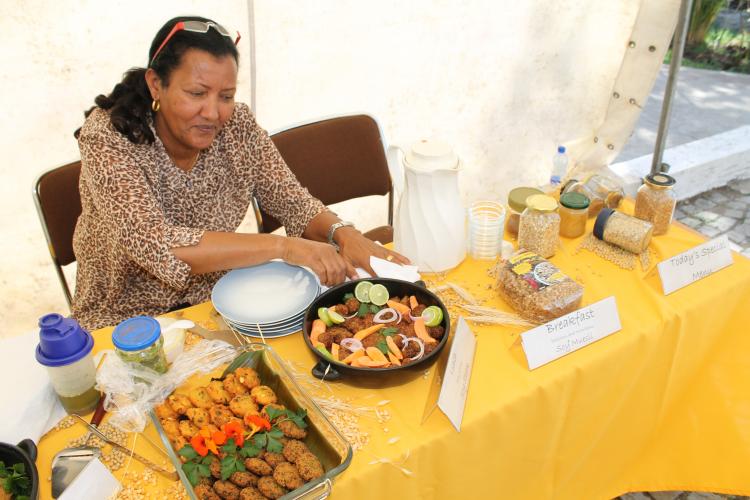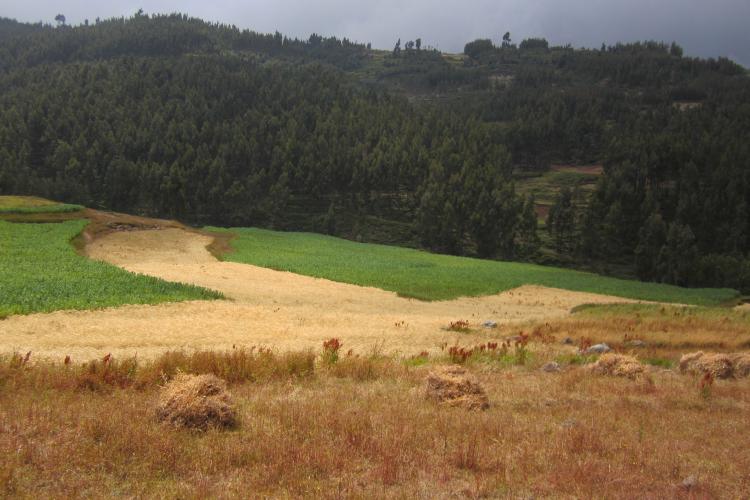- Details
The 2.5-day Pulses Immersion at the Culinary Institute of America in Napa Valley served as the official “West Coast” launch for the International Year of Pulses, and also a deep-dive educational event for cooking and baking bloggers, test kitchen editors, and health/nutrition influencers.
Read the event recap:
- Details
This article originally appeared on the ICARDA CGIAR website.
 Wondering if pulses have limited place in foods?
Wondering if pulses have limited place in foods?
Mrs. Alem Greiling proved anything is possible with pulses at the LovePulses Product Innovation Competition in Ethiopia, held this week on January 25, 2016. Winning the national competition held as part of 2016 International Year of Pulses (IYP 2016), Mrs. Greiling showcased six new nutritious and delicious pulse-based products as ‘special menu’ of the day, starting with breakfast, lunch, snack, right up to dinner.
Dishes were created using chickpea, pea and soya with other locally available ingredients such as moringa, sesame, and honey to prepare soy-based cereals and pancakes for breakfast, soy steak for lunch, and soy sprout salad and ‘meatballs’ of chickpea and spiced pea for dinner. In addition, attendees enjoyed sampling Soy Power Bars that can be consumed as a midday snack.
The LovePulses Competition, held at the Ethiopian Institute of Agricultural Research (EIAR) headquarters, was jointly organized by EIAR and ICARDA to raise the profile of pulses both in the kitchen and on farmers’ fields.
(See photos from pulses competition and feasts hosted by ICARDA)
The event was attended by about 110 participants along with EIAR Director General, Dr. Fantahun Mengistu and representatives from the Ministry of Agriculture and Natural Resources. Eight competitors from small enterprises and instiutions displayed pulses (legumes) products using faba bean, field pea, chickpea, common bean, mung bean, lentil, and cowpea.
Dr. Asnake Fikre, Crop Director of EIAR, gave the opening statement to introduce the event, followed by a talk from Dr. Mengistu about Ethiopia’s pulses (food legumes) research program.
Highlighting the importance of pulses for the country, Dr. Mengistu stated that “Ethiopia is a major producer of pulses in sub-Saharan Africa and the crops play an important role in the farming systems.” He pointed out that pulses are contributing to food and nutritional security, and income generation for close to 8 million smallholder farmers who cultivated these crops. These are crops for diversification, intensification and sustainability of agriculture, and generate foreign exchange revenue as export commodity for the country.
EIAR has developed and released several improved legume varieties and technologies, working in research partnership with CGIAR centers like ICARDA, which are in the hands of farmers increasing production and productivity, and changing livelihoods of farmers in the country.
Dr. Zewdie Bishaw, heading Seed Unit at ICARDA and based at the center’s research platform in Ethiopia, pointed out that even though pulses offer a unique combination of food and nutritional security and environmental sustainability when compared to the ‘three big cereals’- maize, wheat and rice, the area planted with pulses globally are a pale comparison to area covered with these cereal crops. Pulse yields and production have been stagnant in the developing countries over the past few decades. “Agricultural research and development in many of these countries are concentrated on cereals while pulses lag behind in terms of area expansion and productivity gains,” said Dr. Bishaw, calling for greater focus on pulses research.
Following the opening remarks, the contestants presented their LovePulses product creations amidst excitement and anticipation with a panel of leading experts called in as judges – former senior chefs from Hilton and Sheraton hotels, head of Health and Nutrition Research Institute, and experts from food and beverages industry, EIAR and the Ministry of Agriculture and Natural Resources.
All participants were recognized with certificate of participation while Mrs. Greiling’s products have the opportunity to be globally showcased at the Institute of Food Technologists in Chicago on July 16-19 and possibly at other IYP 2016 events.
The elaborately planned event stirred national attention and received wide media interest, thanks to the efforts of the event organizing committee chaired by Dr. Fikre from EIAR with members from EIAR and ICARDA staff.
Ethiopia is one of the several countries participating in the LovePulses Competition being held nationally and virtually this year.
- Details
 The “Pulses Meals Exhibition and Lunch Organisation” held on 23rd January, 2016 by Mersin Commodity Exchange in cooperation with TASPAKON (Confederation of all chefs and pastry chefs ) for IYP-International Pulses Year 2016 drew great interest.
The “Pulses Meals Exhibition and Lunch Organisation” held on 23rd January, 2016 by Mersin Commodity Exchange in cooperation with TASPAKON (Confederation of all chefs and pastry chefs ) for IYP-International Pulses Year 2016 drew great interest.
Participants of the organisation were, Mersin Governor Ozdemir Cakacak, Canada Ambassador John Holmes, Metropolitan Municipality Mayor Burhanettin Kocamaz, high-ranking and related bureaucrats, representatives of non-governmental organizations, movers and shakers of Pulses and employees of sector.
Both the best 20 chefs from all around Turkey (Istanbul, Ankara, Van, Erzurum, Elazıg, Kutahya, Adana, Antalya etc.) and 6 chefs from Mersin, prepared 120 pulses meals, hand in glove, and this was a first in the world.
There were traditional, regional, innovative meals in the Pulses Meals Exhibition. All the visitors showed great interest in the exhibition.
After the Exhibition part, all the participants and also visitors enjoyed a lunch consisting of pulses meals.
 During the lunch the Chairman of Mersin Commodity Exchange, O.Abdullah Ozdemir, The Chairman of GPC- Global Pulse Confederation Huseyin Arslan, Metropolitan Municipality Mayor Burhanettin Kocamaz, Canada Ambassador John Holmes and Mersin Governor Ozdemir Cakacak addressed a speech .
During the lunch the Chairman of Mersin Commodity Exchange, O.Abdullah Ozdemir, The Chairman of GPC- Global Pulse Confederation Huseyin Arslan, Metropolitan Municipality Mayor Burhanettin Kocamaz, Canada Ambassador John Holmes and Mersin Governor Ozdemir Cakacak addressed a speech .
The presenter of the organisation Wilco Van Herpen (journalist writing in Hurriyet Daily News, a producer and gourmet) expressed himself by saying “I’ve been with various organizations up to today, but I‘m so glad to be here now, this organisation is one of the best one’s I‘ve ever seen, it’s so interesting, cause it is about agriculture, it’s about business, it’s about flavor, it’s about aesthetic”
The Chairman of Mersin Commodity Exchang, O. Abdullah Ozdemir said that; all meals as part of The Pulses Meals Exhibition will share recipes on the website of Commodity Exchange and will prepare a recipe book consisting of the mentioned Pulses Meals.
- Details
This article was originally posted on ICARDA.org.

Farmers in the Amhara Region of Ethiopia are among the largest faba bean producers, but have all but lost hope in the crop. Ethiopian faba bean production was abandoned for over a decade due to low productivity as a result of disease and natural resource degradation. Farmers by dropping the crop from farming systems, were forced to fallow the land in order to maintain soil fertility for barley production.
However, in North Shewa, farming communities see hope in the latest faba bean crop demonstrated at a field day organized by the Debre Birhan Agricultural Research Center (DBARC) and ICARDA in close cooperation with the Bureau of Agriculture and Administration in November.
Under a USAID-supported malt barley and faba bean project implemented by ICARDA and in partnership with DBARC, a new faba bean variety has been introduced both to resurrect the crop and initiate community seed production and expand production. A faba bean variety Walki (high yielding, disease resistant and waterlogging tolerant) was introduced based on farmer preferences following a participatory selection process conducted by the Africa Rising project implemented by ICARDA and DBARC.
“Once our village was a major producer of faba bean, but we lost hope,” said Yeshewalul Tilaye and his fellow farmers at Chichet village of Tarma Ber. “Today we are very much excited to see a faba bean crop with such wonderful performance. We have seen it with our own eyes and come to believe that there is hope for growing faba bean once again in our farms.”
Participating farmers praised the effort of DBARC and ICARDA and the support of USAID and requested that the program to expand to ensure access to seed and adopt the technology. North Shewa farmers are now convinced that bringing back faba bean to the production system will not only improve food and nutritional security, but break the cycle of fallowing, which will be enabling them to improve crop production and productivity by ameliorating soil fertility through nitrogen fixation.
At Andit Tid Station, faba bean seed production was initiated with 23 farmers in two clusters. Seed production fields were inspected and approved by the regional seed certification agency. Cooperatives have agreed to put aside the necessary budget to buy seed and distribute to other farmers. At Woinber, the BoA has agreed to follow suit where seed is further increased during the off-season and distributed for the main cropping season.
The Head of BoA and District Administration from both districts vowed to support the effort to further expand the crop and ensure that farmers get the necessary support in producing faba bean and provide complimentary packages necessary for faba bean production, such as biofertilizers and fungicide for gall disease control.
ICARDA and DBARC teams have provided necessary information about the new faba bean variety and the associated agronomic packages for its production. Teams have provided concepts for community seed production and will ensure a sustainable source of quality seed. Activities will continue to be linked to malt barley scaling-up activities in the 2016 cropping season.
